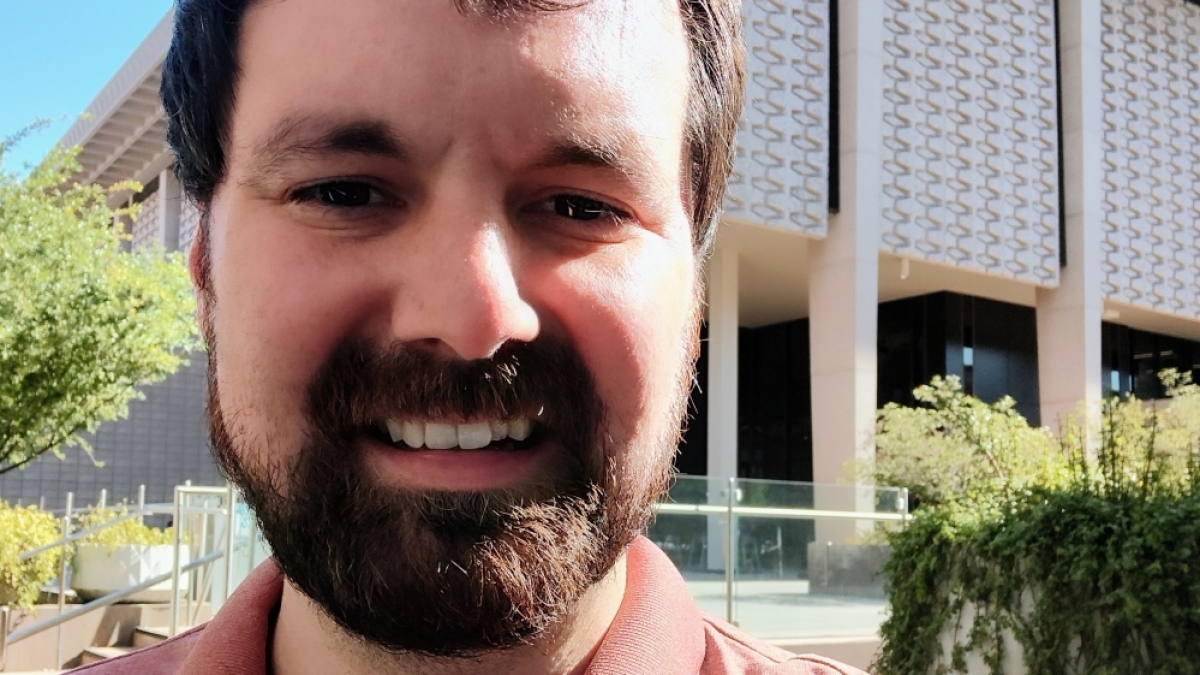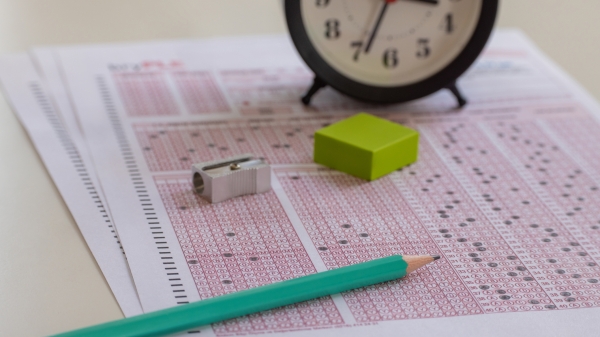ASU linguist is outstanding humanities grad

Graduating ASU student Ryan Dekker said that he enjoyed the quantitative side of his doctoral research so much that he is switching gears, learning coding languages and planning to pursue an industry job, rather than an academic one.
Editor’s note: This story is part of a series of profiles of notable spring 2024 graduates.
You can take a guy out of the South, but can you get rid of his accent? And does it matter?
These questions were among those explored by graduating Arizona State University student Ryan Dekker in his doctoral research.
“It's one thing to have an impression that some people sound ‘Southern’ but using precise phonetic measurements strengthens these claims,” Dekker, who is originally from Watkinsville, Georgia, said. “Because a ‘Southern accent’ is largely stigmatized, I wanted to see whether Southern audiences could still hear ‘Southern’ pronunciations from their local news they would hear on a daily basis.”
Dekker defended his dissertation, “A Sociophonetic Profile of Local News throughout the U.S. South: The Southern Vowel Shift in Mid-sized Southern Cities,” on March 22. In his research, which he has also presented at national conferences, Dekker found that age was not a factor in how “Southern” someone sounded, but gender was.
“Men were always more likely to sound ‘Southern’ and lean in to that folksy authenticity but women generally did not lean into those solidarity attributes. These likely reflect larger societal aspects beyond broadcasters, or even Southern accents, where women would be more harshly judged for doing the same behavior as men.”
Dekker also reached similar conclusions about how gender interacts with language, and vice versa, in his study of the Brett Kavanaugh hearings. Dekker used critical discourse analysis — a way to examine how verbal and non-verbal cues are used to communicate — in this research.
“I used conversational analysis conventions to put (Kavanaugh's) speech under a microscope and examine aspects like his interruptions through speech overlap, loudness of voice and averting gaze from the questioning senator," Dekker said. "Applying these techniques methodically can go behind initial impressions and definitively state how gender was a factor in how Justice Kavanaugh treated his questioning senator.”
Dekker found that “during sessions led by women, Kavanaugh was more likely to interrupt, raise his voice, turn to address the audience, return questions to the senators and avert gaze. When being questioned by men, he had more instances of a noticeably softer voice and a higher rate of more deferential speech overlap that consisted of three or fewer words.”
Dekker published his findings, “Comparing Justice Kavanaugh’s Special Hearing Nomination Testimony Directed toward Women and Men: A Critical Discourse Analysis Study” in the International Journal of Interdisciplinary Civic and Political Studies in 2022.
Dekker is earning a PhD in linguistics and applied linguistics in the Department of English this spring. He was named the University Outstanding Graduate Student for humanities in The College of Liberal Arts and Sciences on the strength of his research and academic record.
As for what’s next? Dekker said that he enjoyed the quantitative side of his research so much that he is switching gears and plans to use those skills in an industry job, rather than an academic one.
We caught up with Dekker just before classes let out to ask a few more questions.
Question: What was your “aha” moment, when you realized you wanted to study in your field?
Answer: When I was doing the master’s in linguistics, I was a staff member at the University of Georgia, where (tuition) was paid as a staff benefit. Taking graduate classes “for free,” I was unsure if I would continue in this field even though I had a strong interest. During the first semester, I took both phonetics/phonology and syntax, and when I had my first homework assignment for both classes one night, I felt deeply invested and even more intrigued. Getting those very first graduate-level homework assignments were my “aha” moment. Getting that chance to study at a graduate level cemented my passion for this work and I knew I wanted to change gears towards academia.
Q: What’s something you learned while at ASU — in the classroom or otherwise — that surprised you, that changed your perspective?
A: Beyond what was posted on the class syllabi, I had to learn how to juggle several classes’ worth of graduate coursework while teaching my own. So, I would say something that has surprised me was always trying to do just a little more than I initially thought I could, which ended up being effective for me. I felt it was a good way to set some boundaries by knowing where my limits are but still trying to do one more small task. It's still something I tell myself — “just do a little more than you thought you could.”
Q: Why did you choose ASU?
A: Easy answer! The English department offered me funding through a teaching stipend, and I was honored to have that responsibility while my tuition was covered. I applied to several schools throughout the country and was impressed by the range of specialties found here in the program. It’s been an academically stimulating environment being able to study a range of disciplines as a doctoral student in the linguistics and applied linguistics program. Through my study in discourse analysis, I was able to publish my critical discourse analysis paper, as well as what I have been focusing on, which has been presenting at conferences with my socio-phonetics work.
Q: Which professor taught you the most important lesson while at ASU?
A: Working with (Professor of English Karen Adams) as my advisor, we instituted soft deadlines for turning in my work and drafts of my dissertation. This helped set me up not for failure but for success. She was also both honest and still encouraging when getting feedback from her. This type of mentorship is valuable and taught me lessons outside academia.
Q: What’s the best piece of advice you’d give to those still in school?
A: If you’re feeling frustrated with something, let it sit. Either do a completely different task or take a well-deserved breather. Writing while frustrated only leads to more frustration.
Q: What was your favorite spot for power studying?
A: Definitely one of the enclaves in Ross-Blakley Hall on either the first or the second floor.
Q: What are your plans after graduation?
A: Although I’m not from the area, I’ve put roots down in the Valley of the Sun. And I’ve decided I want to stay here rather than chase down jobs across the country in a volatile academic job market. Still, this decision comes from a position where I truly enjoyed the quantitative work I did for my dissertation and the learning process that went with sharpening that toolset. I’ve been learning, and applied, programming languages of R and Python to my work in phonetics and I want to use those same skills — both “big picture” in answering social questions and “small picture” in fixing programming mistakes. Because I’ve enjoyed this type of work, I decided to transition into industry and broaden the skills I’ve learned here at ASU.
Q: If someone gave you $40 million to solve one problem on our planet, what would you tackle?
A: I’d like to do something for the local Phoenix metro and contribute to something important. I’d take that money and use it towards helping our already improving public transit and bike-lane infrastructure here in the Valley. Making our community less car dependent helps de-clog traffic, ameliorate environment concerns and gives people more options to complete daily tasks.
More Sun Devil community

ASU president connects with veterans during town hall
Arizona State University President Michael Crow shared his family’s military background, provided university updates and reaffirmed ASU’s commitment to military-affiliated students during a town hall…

Tested tips for taking exams
With May quickly approaching, many students are starting to prep for their most important tests of the year — final exams.Toni Miceli, the inaugural director of the bar exam success program at…

School of Transborder Studies celebrates 15th anniversary
During the summer before his freshman year at Arizona State University, Salvador Macias participated in the AGUILA Youth Leadership Institute, a college access organization designed to help young…

